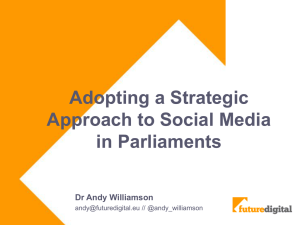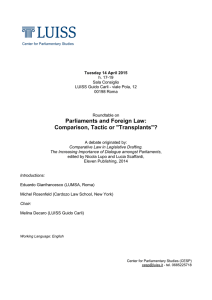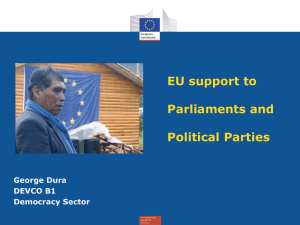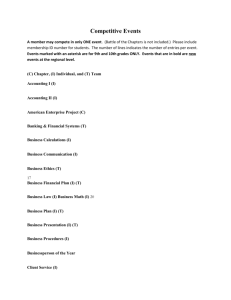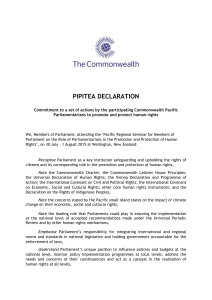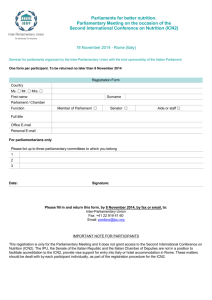P Parliaments and development Briefing Paper
advertisement
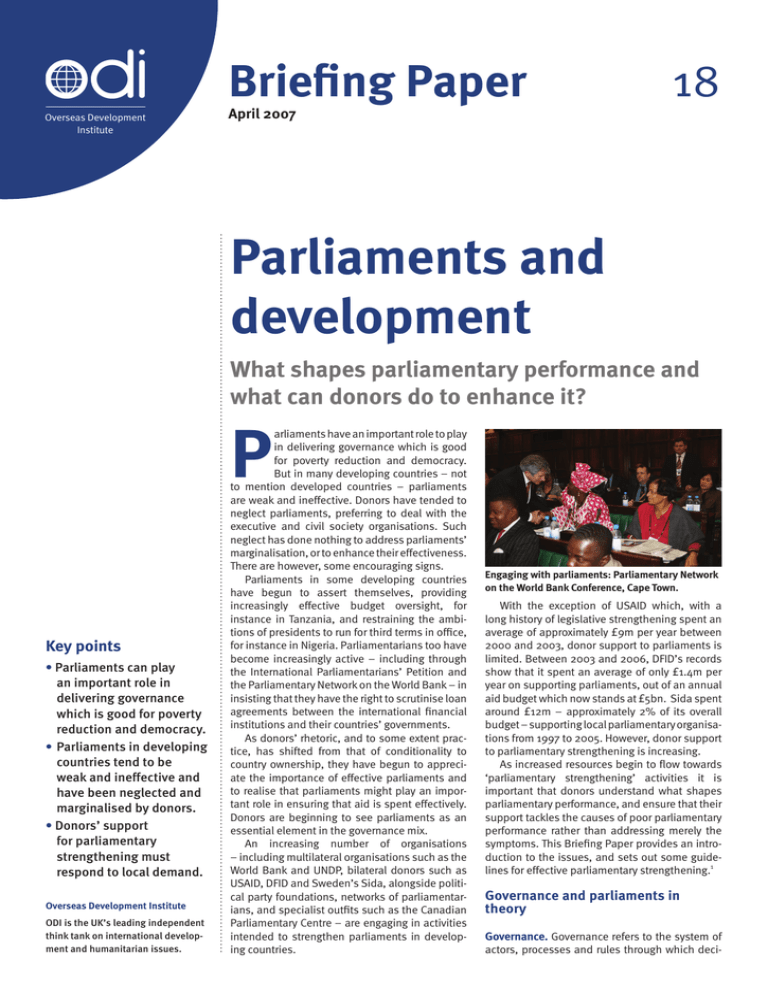
Briefing Paper Overseas Development Institute April 2007 18 Parliaments and development What shapes parliamentary performance and what can donors do to enhance it? P Key points • Parliaments can play an important role in delivering governance which is good for poverty reduction and democracy. • Parliaments in developing countries tend to be weak and ineffective and have been neglected and marginalised by donors. • Donors’ support for parliamentary strengthening must respond to local demand. Overseas Development Institute ODI is the UK’s leading independent think tank on international development and humanitarian issues. arliaments have an important role to play in delivering governance which is good for poverty reduction and democracy. But in many developing countries – not to mention developed countries – parliaments are weak and ineffective. Donors have tended to neglect parliaments, preferring to deal with the executive and civil society organisations. Such neglect has done nothing to address parliaments’ marginalisation, or to enhance their effectiveness. There are however, some encouraging signs. Parliaments in some developing countries have begun to assert themselves, providing increasingly effective budget oversight, for instance in Tanzania, and restraining the ambitions of presidents to run for third terms in office, for instance in Nigeria. Parliamentarians too have become increasingly active – including through the International Parliamentarians’ Petition and the Parliamentary Network on the World Bank – in insisting that they have the right to scrutinise loan agreements between the international financial institutions and their countries’ governments. As donors’ rhetoric, and to some extent practice, has shifted from that of conditionality to country ownership, they have begun to appreciate the importance of effective parliaments and to realise that parliaments might play an important role in ensuring that aid is spent effectively. Donors are beginning to see parliaments as an essential element in the governance mix. An increasing number of organisations – including multilateral organisations such as the World Bank and UNDP, bilateral donors such as USAID, DFID and Sweden’s Sida, alongside political party foundations, networks of parliamentarians, and specialist outfits such as the Canadian Parliamentary Centre – are engaging in activities intended to strengthen parliaments in developing countries. Engaging with parliaments: Parliamentary Network on the World Bank Conference, Cape Town. With the exception of USAID which, with a long history of legislative strengthening spent an average of approximately £9m per year between 2000 and 2003, donor support to parliaments is limited. Between 2003 and 2006, DFID’s records show that it spent an average of only £1.4m per year on supporting parliaments, out of an annual aid budget which now stands at £5bn. Sida spent around £12m – approximately 2% of its overall budget – supporting local parliamentary organisations from 1997 to 2005. However, donor support to parliamentary strengthening is increasing. As increased resources begin to flow towards ‘parliamentary strengthening’ activities it is important that donors understand what shapes parliamentary performance, and ensure that their support tackles the causes of poor parliamentary performance rather than addressing merely the symptoms. This Briefing Paper provides an introduction to the issues, and sets out some guidelines for effective parliamentary strengthening.1 Governance and parliaments in theory Governance. Governance refers to the system of actors, processes and rules through which deci- Briefing Paper sions are made and authority is exercised in a society. Relations between the state and its citizens are a particularly important aspect of governance, because the state Parliamentary roles sets and polices a society’s formal rules. Good governance – ultimately, governLegislation ance which is good for poverty reduction – requires state capability, accountability Oversight and responsiveness (DFID, 2006). State capability concerns the ability of Representation the state to formulate and implement policies that are effective in reducing poverty. Accountability concerns the relationships between those who make decisions and those on whose behalf such decisions are made (or, more broadly, those who feel the impact of those decisions). When citizens are able to demand that the state provides justifications for its action, and are able to sanction the state if it fails to do what it has promised, then there is accountability. The state is considered responsive if it seeks to identify and meet the needs of its citizens. Figure 1: Governance and parliaments: Elements and roles Effective governance State capability Accountability Responsiveness Parliaments. Parliaments and parliamentarians play a variety of roles. Their primary roles are those of legislation, oversight and representation. Legislation is about passing the laws which constitute a country’s legal framework. Oversight is about keeping an eye on the activities of the executive, and holding the executive to account on behalf of citizens. A particularly important element of oversight concerns the budget; checking that spending decisions are in line with national priorities. Representation is about collecting, aggregating and expressing the concerns, opinions and preferences of citizen-voters. Parliaments and governance. Mapping the roles of parliaments onto the elements of good governance (Figure 1) indicates the contribution which parliaments can make to the delivery of good governance and to what the World Bank refers to as ‘National Governance Systems’. Legislation is part of state capability; lawmaking is an important way in which capable states formulate and implement policies. Parliamentary oversight can contribute to ensuring that the relationship between the state and its citizens is one which is characterised by accountability. And representation is crucial to responsiveness; there is little chance of political decision-makers being responsive if citizens’ views are not transmitted effectively by their political representatives. There is more to good governance than parliamentary representation, legislation and oversight, but in the absence of a parliament which can effectively perform these roles, good governance – and particularly good democratic governance – will be elusive. Governance and parliaments in practice Parliaments are ineffective… There have been few systematic efforts to assess and compare parliamentary performance and the contribution of parliaments to delivering good governance. This is partly because it is difficult, and partly because donors have made 2 insufficient effort in this regard.2 But the evidence suggests that in practice, parliaments in most developing countries are ineffective. Rather than enhancing state capability, accountability and responsiveness, parliaments are often little more than ‘rubber-stamp’ legislatures, approving the executive’s plans and doing little to deliver good governance or poverty reduction. For instance, the African Governance Report for 2005 found that: ‘In terms of enacting laws, debating national issues, checking the activities of the government and in general promoting the welfare of the people, these duties and obligations are rarely performed with efficiency and effectiveness in many African parliaments’ (UNECA, 2005). … because MPs lack appropriate incentives and parliaments lack resources. There are various reasons for poor parliamentary performance. Often, parliamentarians lack the knowledge, skills and resources to do their jobs effectively, may be more concerned with retaining their seat than with holding the executive to account, or – if they do seek to vigorously hold the executive to account – find that they lose their seat before long. And in many countries, women are drastically under-represented in parliament. Parliaments themselves lack the institutional capacity and resources which they need. Parliamentary rules and procedures may be poorly developed, parliamentary committees may be weak or non-existent and there may be more basic infrastructural problems. Such problems include inadequate or non-existent accommodation, a lack of access to information, information technology, and library facilities, a lack of parliamentary staff to assist in the administration of parliamentary affairs and, in particular, in carrying out the research which is needed for parliaments to hold the executive to account. Fundamentally, such challenges result from the fact that parliaments receive insufficient funding, and are dependent for this funding on the executive, which may not be keen to see a stronger legislature. Parliaments are constrained by the formal political system. In some countries, the constitution may fail to establish a clear role and powers for parliaments. And even when this fundamental building block is in place, the reality is often that parliament is very weak compared to the executive. The African Governance Report found that only a third of African legislatures were perceived as being largely free from the control of the executive in all major areas of legislation, and that more than half were under various degrees of subordination in all major areas of legislation. Namibia, South Africa and Ghana were regarded as being the least subordinate, with Swaziland, Kenya and Ethiopia ranked as the most subordinate (UNECA, 2005). In addition to executive dominance, there are other aspects of a political system which can hinder parliamentary performance. These include a very dominant ruling party – for instance, the ANC in South Africa – the lack of an effective opposition (or even the idea of an opposition), electoral systems which hinder accountability, and either overly-strict party discipline Briefing Paper which constrains MPs’ actions, or an absence of political parties based around different political ideologies with the result that voters are denied real political choices. Parliamentary performance is shaped by the wider social and cultural environment. Beyond the formal political system, parliamentary performance is shaped too by the social and cultural environment in which parliaments are situated. Put differently, the formal rules of politics are often at odds with the informal realities of social relations and cultural understandings. In many developing countries, where the social system is one of neo-patrimonialism and ‘big men’ looking after their clients, MPs are expected to provide school fees, medical bills, roads and financing for their constituents and constituencies, rather than being expected to represent their interests in processes of legislation and oversight. Relatedly, when the state is the primary source of economic power, and politics is about providing resources for constituents, politicians who are not able to access the state’s resources and hence are unable to provide for their constituents find themselves without much of a role to play. This can prevent the emergence of effective opposition parties, particularly when it is combined with the practice of ‘floor-crossing’, with MPs switching parties to access resources. Parliamentary performance may also suffer because of weak links and a lack of consultation between parliaments and other elements of civil society, the media, the private sector, trade unions and so on – this is something that DFID’s Governance and Transparency Fund might usefully address. Aid relationships often marginalise parliaments. Development partners and donors share some responsibility for weak parliamentary performance. The focus of donor interventions in support of good governance has tended to be on the executive; an effective state has been equated with an effective executive and civil service. Whilst there is clearly value in donors working closely with the executive, an overly-exclusive focus on this branch of government does risk marginalising parliaments. The IMF and World Bank have also marginalised parliaments. Whereas civil society participation was encouraged, parliaments were initially excluded from the PRSP process. And parliaments have not had the right to see or scrutinise the conditions attached to loans offered by the international financial institutions. This undermines democratic domestic accountability and risks further marginalising parliaments. There are some limited signs of change in the behaviour of donors and the international financial institutions. It is to be hoped that donor interest in, and Paris Declaration commitments on, aid effectiveness, particularly those relating to ownership and domestic accountability, will accelerate changes in donor practice. Parliamentary performance – good and bad – is shaped by a range of factors; MPs and their incentives; parliaments and their resources; the formal political system; the wider social and cultural environment; Box 1: Three country case studies Ghana – Partnerships and local ownership deliver results. The Canadian Parliamentary Centre has worked with the Parliament of Ghana to help to build its capacity since the mid-1990’s. The focus of the project – designed in partnership with the Parliament of Ghana – is to support key parliamentary committees. The Parliamentary Centre, from its Accra office, works alongside a number of organisations including civil society organisations. The project has had considerable success in entrenching democratic development and institutionalising good parliamentary practices. Reasons for its success include the fact that it has taken seriously the notion of partnership and responding to local demands, because it has involved long-term engagement, and because it provided practical assistance which MPs found useful. Vietnam – Supply-driven projects deliver inappropriate activities. Between 1998 and 2001, Sweden’s Sida financed a co-operation project between the administrative branches of the Swedish Parliament – the Riksdag – and the National Assembly of Viet Nam. The aims were to increase the skills and capacity of the professional staff and members of the National Assembly and increase public and media access to the Assembly. The project was supply-led, with the impetus coming from the Riksdag, and a level of financial support agreed before much thought was given to how the money might be spent. As a result, there was some misunderstanding about who had responsibility for doing what, and little consideration of whether the activities to be undertaken were appropriate. On the positive side, and in contrast to many other donors, Sida conducted and published a thorough evaluation of the project, enabling lessons to be learned. Pakistan – Coordination and harmonisation can be achieved. Commencing in January 2003 and with a budget of £500,000 this DFID-funded project was intended to develop effective and responsive national and provincial assemblies following the return to parliamentary democracy after three years of military rule. Donors worked hard early on to ensure that their support to parliament was coordinated, and to ensure that relevant government departments and parliamentary bodies were engaged. The Pakistan Institute of Legislative Development and Training (PILDAT) was carefully selected to be the local partner. On completion of the project in 2006, parliamentary capacity had been placed squarely on the Government’s agenda and training for legislators had begun, and the capacities of the national and provincial assemblies had been enhanced. and aid relationships. To be effective, parliamentary strengthening must take account of the range of factors which shape parliamentary performance and the embeddedness of MPs and parliaments within the wider political, social and cultural environment. As Sida’s excellent review of its parliamentary strengthening work put it ‘too often, parliamentary support programmes have focused on parliament as a selfcontained institution and, as a result, have concentrated on the symptoms of a dysfunctional political process, rather than the underlying causes’ (Hubli and Schmidt, 2005). Parliamentary strengthening Which organisations are involved in parliamentary strengthening? A wide range of organisations are involved in parliamentary strengthening. In terms of bilateral donors, USAID, Canada’s CIDA, Sweden’s Sida and the UK’s DFID are particularly active, alongside Austria, Belgium, Denmark and Germany. In terms of multilateral organisations, the World Bank, the UNDP, the Inter-American Development Bank, and the European Union are prominent. There are also a number of international parliamentary organisations and networks such as the Canadian Parliamentary Centre, the 3 Briefing Paper Inter-Parliamentary Union, the Commonwealth Parliamentary Association, European Parliamentarians for Africa (AWEPA), the Parliamentary Network on the World Bank (PNoWB) and the Global Organisation of Parliamentarians Against Corruption (GOPAC). Next, there are a range of organisations whose work on democracy, political parties and electoral systems sees them engage too with parliaments. These include, the National Democratic Institute for International Affairs (NDI), the German political party foundations (stiftungen), the International Institute for Democracy and Electoral Assistance (IDEA), the Netherlands Institute for Multi-Party Democracy, and the Westminster Foundation for Democracy (WFfD). Finally, there are a number of think tanks, not-for-profits and private sector organisations active in this area. Many of these organisations have considerable experience and excellent links with developing countries – for instance, the Canadian Parliamentary Centre has an African network and an emerging Asian network, and the Parliamentary Network on the World Bank has established chapters across the developing world. It is however, notable that most of the organisations which are active in terms of parliamentary strengthening, have their origins in the developed world. Overseas Development Institute 111 Westminster Bridge Road, London SE1 7JD Tel: +44 (0)20 7922 0300 Fax: +44 (0)20 7922 0399 Email: publications@odi.org.uk Briefing Papers present objective information on important development issues. Readers are encouraged to quote or reproduce material from them for their own publications, but as copyright holder, ODI requests due acknowledgement and a copy of the publication. This and other ODI Briefing Papers are available from www.odi.org.uk © Overseas Development Institute 2007 ISSN 0140-8682 What approaches are there to parliamentary strengthening? Parliamentary strengthening varies from working with individual MPs, to working with parliament as an institution, to engaging with the wider political system within which parliament is situated (see box 1). DFID’s parliamentary strengthening activities have, for instance, included work with parliamentary committees (Bangladesh, Ghana, Kenya, South Africa); capacity building for federal and regional parliaments (Ethiopia and Nigeria); support for parliaments’ efforts to develop a strategic plan (Malawi and Uganda); strengthening civil society’s engagement with parliament (Mozambique); and building a library for the Legislative Council (Palestine). Any one organisation may – and should – tailor its approach to parliamentary strengthening to the particular country context, but different organisations do tend to favour different approaches. For instance, in its parliamentary strengthening work, the World Bank avoids engaging with the wider political system within which parliaments are situated. International-IDEA on the other hand engages explicitly with the wider context of elections and political parties, and in this way seeks to strengthen parliaments in developing countries. poverty and building democracy. But in practice parliaments in many developing countries are weak and ineffective. If parliaments are to play an effective role in delivering good governance in developing countries, they will need support – including financial support – from donors. In order to strengthen parliaments, donors and other organisations must first understand the reasons for poor parliamentary performance, whether these relate to MPs, their incentives and resources, parliaments themselves, the formal political system within which parliaments operate, the wider social and cultural environment within which parliaments are situated, or donors’ aid relationships with governments in developing countries. The lack of systematic data about what works, makes it a challenge to design effective parliamentary strengthening programmes. However, it is possible to identify some guidelines for parliamentary strengthening, which donors should follow: • Respond to demand: Respond to what parliaments and other development stakeholders say they need in terms of parliamentary strengthening. Do not impose inappropriate models of how parliament should work. • Address causes: Address the causes of poor parliamentary performance, rather than solely the symptoms. • Take account of context: Take full account of the local context – including the political context – within which parliaments function. • Involve recipients: Involve a range of local organisations, and interest groups, including opposition MPs and parties as well as members of the government. • Focus on issues: Use particular issues such as budget oversight, anti-corruption, HIV/AIDS and poverty reduction as entry-points for improving parliamentary performance, rather than focusing solely on parliamentary procedures. • Coordinate and deliver appropriate activities: Coordinate activities with other agencies, and ensure that activities are appropriate to the objectives of parliamentary strengthening. Study visits to developed countries and seminars are not always appropriate. • Provide long-term sustainable support. For their part, when parliaments in developing countries are approached by donors keen to provide support, they should insist that donors follow these guidelines. Most importantly, they should ensure that donors’ plans are responsive to local needs. Conclusions and guidelines Parliaments can play an important role in delivering governance which is good both in terms of reducing Written by Alan Hudson, ODI Research Fellow (a.hudson@odi.org.uk). Notes and references 1. This Briefing Paper is based on a DFID-funded review of parliamentary strengthening. DFID’s support is gratefully acknowledged, but the views expressed in this paper are the author’s alone. For further details and the report: www.odi. org.uk/pppg/politics_and_governance/ps.html 2. The report (referred to in Note 1) includes information on existing initiatives to assess parliamentary performance. DFID (2006) Eliminating World Poverty: Making Governance work for the Poor. www.dfid.gov.uk/wp2006 Hubli, K.S. and Schmidt, M. (2005) ‘Approaches to Parliamentary Strengthening: A Review of Sida’s Support to Parliaments’, Sida Evaluation 05/27. www.sida.se UNECA (2005) African Governance Report. www.uneca.org Photo credit: Parliamentary Network on the World Bank
